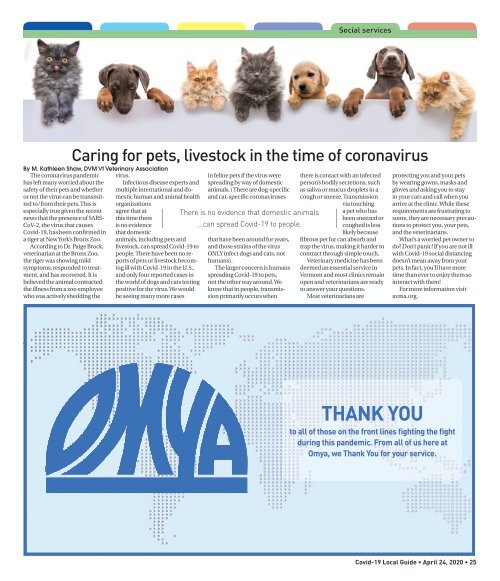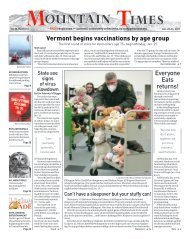COVID-19 Local Resource Guide
You also want an ePaper? Increase the reach of your titles
YUMPU automatically turns print PDFs into web optimized ePapers that Google loves.
Social services<br />
Caring for pets, livestock in the time of coronavirus<br />
By M. Kathleen Shaw, DVM Vt Veterinary Association<br />
The coronavirus pandemic<br />
has left many worried about the<br />
safety of their pets and whether<br />
or not the virus can be transmitted<br />
to/from their pets. This is<br />
especially true given the recent<br />
news that the presence of SARS-<br />
CoV-2, the virus that causes<br />
Covid-<strong>19</strong>, has been confirmed in<br />
a tiger at New York’s Bronx Zoo.<br />
According to Dr. Paige Brock,<br />
veterinarian at the Bronx Zoo,<br />
the tiger was showing mild<br />
symptoms, responded to treatment,<br />
and has recovered. It is<br />
believed the animal contracted<br />
the illness from a zoo employee<br />
who was actively shedding the<br />
virus.<br />
Infectious disease experts and<br />
multiple international and domestic<br />
human and animal health<br />
organizations<br />
agree that at<br />
this time there<br />
is no evidence<br />
that domestic<br />
animals, including pets and<br />
livestock, can spread Covid-<strong>19</strong> to<br />
people. There have been no reports<br />
of pets or livestock becoming<br />
ill with Covid-<strong>19</strong> in the U.S.,<br />
and only four reported cases in<br />
the world of dogs and cats testing<br />
positive for the virus. We would<br />
be seeing many more cases<br />
in feline pets if the virus were<br />
spreading by way of domestic<br />
animals. (There are dog-specific<br />
and cat-specific coronaviruses<br />
There is no evidence that domestic animals<br />
...can spread Covid-<strong>19</strong> to people.<br />
that have been around for years,<br />
and those strains of the virus<br />
ONLY infect dogs and cats, not<br />
humans).<br />
The larger concern is humans<br />
spreading Covid-<strong>19</strong> to pets,<br />
not the other way around. We<br />
know that in people, transmission<br />
primarily occurs when<br />
there is contact with an infected<br />
person’s bodily secretions, such<br />
as saliva or mucus droplets in a<br />
cough or sneeze. Transmission<br />
via touching<br />
a pet who has<br />
been sneezed or<br />
coughed is less<br />
likely because<br />
fibrous pet fur can absorb and<br />
trap the virus, making it harder to<br />
contract through simple touch.<br />
Veterinary medicine has been<br />
deemed an essential service in<br />
Vermont and most clinics remain<br />
open and veterinarians are ready<br />
to answer your questions.<br />
Most veterinarians are<br />
protecting you and your pets<br />
by wearing gowns, masks and<br />
gloves and asking you to stay<br />
in your cars and call when you<br />
arrive at the clinic. While these<br />
requirements are frustrating to<br />
some, they are necessary precautions<br />
to protect you, your pets,<br />
and the veterinarians.<br />
What’s a worried pet owner to<br />
do? Don’t panic! If you are not ill<br />
with Covid-<strong>19</strong> social distancing<br />
doesn’t mean away from your<br />
pets. In fact, you’ll have more<br />
time than ever to enjoy them so<br />
interact with them!<br />
For more information visit<br />
avma.org.<br />
THANK YOU<br />
to all of those on the front lines fighting the fight<br />
during this pandemic. From all of us here at<br />
Omya, we Thank You for your service.<br />
Covid-<strong>19</strong> <strong>Local</strong> <strong>Guide</strong> • April 24, 2020 • 25

















